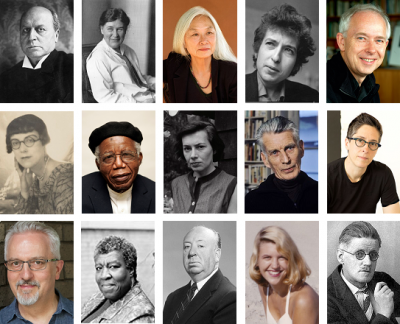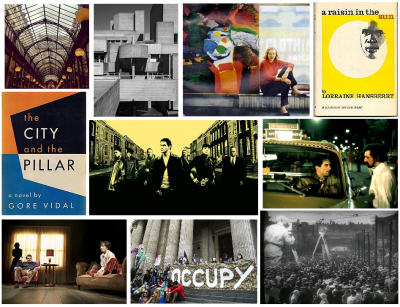Programme Convenor: Dr Scarlett Baron

The English Department offers a one-year MA English degree, focusing on 'Issues in Modern Culture'.
The 2024/25 programme consists of four taught units (Modern Literature and Culture, Critical Contexts, and a wide range of Special Topics of which you choose two), and then a dissertation. Please note that the contents of the modules, as outlined below, is subject to change – texts and topics listed are indicative only.
- Modern Literature and Culture
The first module of the MA, taught over both terms, orchestrates close reading and discussions of a range of nineteenth- and twentieth-century British, American and worldwide Anglophone authors, from Henry James to Patricia Highsmith, from Oulipo to Octavia Butler, and from Virginia Woolf to Maxine Hong Kingston. Each term, students choose one of two paths: 'Modernisms' or 'The Contemporary' (Autumn Term), and 'Experiments in Form' or 'Popular and Visual Cultures' (Spring Term).
- Critical Contexts: Modernity and the City

This course, which is taught in seminars during the autumn term, explores the relationship between modern culture and the city from the 1860s to the present day. It does so by reading literature and other art forms (ranging from the high-brow to the popular) in the context of a broad range of societal, philosophical, and technological developments. It is assessed by a 6000 word essay submitted in the spring term. Seminar groups are usually made up of 20-25 students.
The following topics were covered by the Contexts strand of the programme in the most recent session: Modernity and the City; Underworlds; City Symphonies; Blackness and the City; Class and the City; Abstract Expressionism; Filming New York; Queer Fictions and the City; TV and the City; Domestic Space.- Special Topics
During Special Topics (taught in the Spring term), students will each choose two sets of seminars, each five weeks long. These options will explore specific periods, movements or thematic concerns of related works of literature or films. Each Special Topic is assessed by a 4000 word essay submitted towards the end of the summer term. Seminar groups are usually made up of 12-15 students.
The department will offer six sets of Topics in the spring term. Students on the MA Issues in Modern Culture take two of these Special Topics modules, which change every year.
The Special Topics seminars for spring 2024 are:
- Afrofutures
- Artists' Books
- Complicated Feelings
- Ecopoetics: Literary Ecologies
- The Essay Film: Between Word and Image
- Marxism and Modernism
Topics in previous years have included: Marxist Aesthetics; Contemporary Poetry; Global Anglophone Fiction; History and Fantasy; 21st Century Fiction; Modern Sex; Modernist Days (and Nights); Counterfeit Culture: Authenticity and Originality in American Literature; Modernism and History; Post-War American Poetry; Joyce Amongst the Modernists; Detective Fictions.
Each Special Topics module is worth 15 credits.
- Dissertation
The Dissertation is 12,000 words long. It is worth 60 credits (33% of the final mark) and is submitted at the end of August. Students will be allotted a supervisor who will discuss their initial proposal and read a small quantity of work in draft form.
The independent research and writing undertaken for the dissertation provide the opportunity for students to complete a stand-alone project and entails excellent preparation for students who wish to continue on to doctoral study.
Programme Breakdown
This MA programme is a 180 credit course. Overall, the dissertation (60 credits) is worth 1/3 of your final mark, Modern Literature and Culture (60 credits) is worth another 1/3, and the course essays for Critical Contexts (30 credits) and Special Topics (each module is worth 15 credits) make up the final 1/3 of the final degree classification.
Each module is taught through a weekly two-hour seminar. Full-time students have two seminars per week during the first two terms, while part-time students have one seminar per week.
Part-time
We welcome applications for part-time of this course, as well as full-time. Part-time students in 2024/25 will take the Modern Literature and Culture in their first year, and Special Topics and Critical Contexts in the second year. The dissertations of part-time students are submitted at the end of their second year.
Application Requirements
Candidates for admission to the programme should have at least a good upper second-class honours BA degree in English, or its overseas equivalent, and most successful candidates will have achieved first-class grades in relevant undergraduate modules. Please note that this is an extremely popular course and each year we are unfortunately forced to reject a number of well-qualified candidates.
Most students on the course have BA degrees (or have majored) in English, but we will also consider applicants holding a degree in another subject. In these cases tutors will need to see obvious commitment to the study of English Literature and a strong academic background for these applicants to be successful.
Application Process
We receive most applications between January and March of the proposed year of entry. We are no longer accepting applications for the programme to start in September 2023. The deadline for online applications was on 31 March 2023. The 2024/25 admissions cycle will open in October 2023.
Candidates will be asked to provide transcripts of their academic record with their application, and the tutors will primarily be making decisions over whether or not an applicant is admitted on their previous academic achievements, their personal statement, and their reference. Your personal statement should be a maximum of two A4 pages and demonstrate clearly why you wish to undertake this specific programme of study.
Applicants are not interviewed. Candidates are not required to enclose a writing sample with the initial application.
Further Information
For further information about this course, please email Natasha Clark
Apply Online
A link to the application form, as well as more detailed information about entry requirements, can be found on the prospectus page.
 Close
Close

